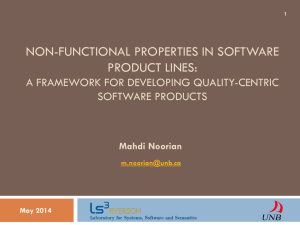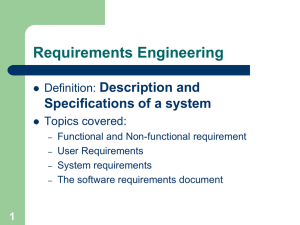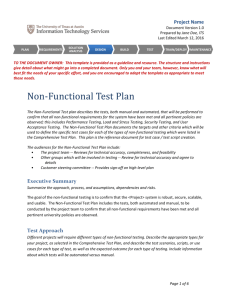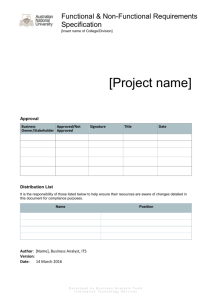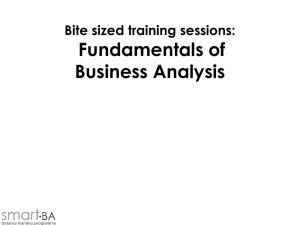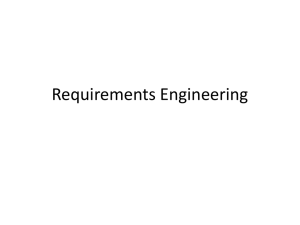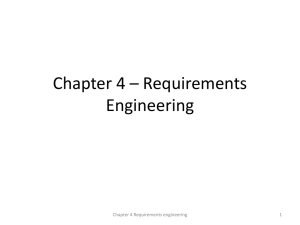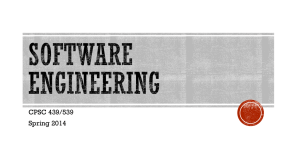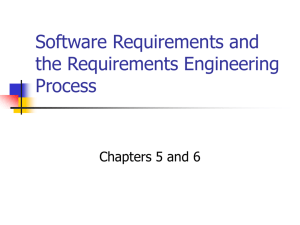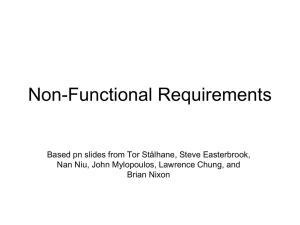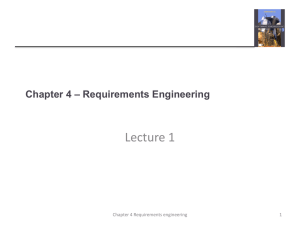09 Non-Functional Requirements - smart-BA!
advertisement
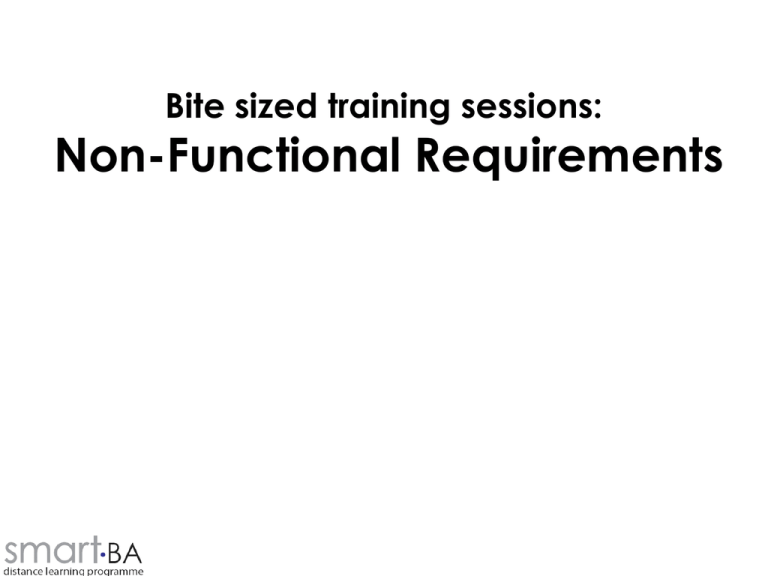
Bite sized training sessions: Non-Functional Requirements Objectives • To understand – What non-functional requirements are – When they can be defined – How they can be defined • To be able to – Define non-functional requirements What are non-functional requirements? • They are requirements • They are not functional, data or process requirements • IIBA Business Analysis Body Of Knowledge (BABOK) v1.6 suggests "Quality of service requirements […] are also known as non-functional requirements“ • ISEB book on Business Analysis suggests “Non-Functional Requirements are concerned with performance and level of operation of the system” • Sad but true: Business Analysis profession – which specialises in analysis and definition – has no (and can have no) definition for a set of requirements named on the basis of what they are not! • Also sad but true: we do need to define requirements which are not functional or data or process requirements Chain Of Reasoning: Drivers Drivers Stakeholders Drivers Drivers Objectives Objectives Objectives Objectives Objectives Change Requirements Stakeholders Change Requirements Change Requirements Change Requirements Change Requirements Change Requirements must be assumed to be wrong until they are proved to be right Scope of analysis of change requirements • Change requirements can be for (amongst others) – Processes – Organisation units – Locations – Channel – Data – Applications – Technologies – Non-functionals …oh – and the valid intersections!!! Requirements Scope Example • • • • • • • • We need to change how we take orders (process)… …by the tele-orders team (organisation unit)… …at our Leeds contact centre (location)… …by phone or email (channel) …to capture alternate delivery addresses (data)… …on the Chordiant system (application)… …running on the intranet (technology)… …and make it available 24/7/365 (non-functional). How to forge links in the Chain Of Reasoning Problem / opportunity analysis Driver Addressed as measured by SMART objectives Project Objective Delivered by Business… Functional… Non-functional… Change Requirement …high level …mid level Enforces Process model Process specification Non-functional specifications Data model Attribute specification Business Rule …low level EXAMPLE way of documenting… Problem / opportunity analysis Driver Addressed as measured by SMART objectives Project Objective Delivered by Business… Functional… Non-functional… No Change Requirement …high level …mid level EXAMPLE High Level Non Functional Requirement Maps To Objectives 1 Training will accommodate 40 delegates over 5 training sessions 1,2,3,4,5 2 Training support will be able to process up to 5 queries at any one time 1,2,4,5 EXAMPLE way of documenting… Problem / opportunity analysis Driver Addressed as measured by SMART objectives Project Objective Delivered by Business… Functional… Non-functional… Change Requirement …high level …mid level Enforces Process model Process specification Non-functional specifications Data model Attribute specification Business Rule …low level EXAMPLE PROCESS RULES A BA can request one of 4 types of support: 1. Phone or email based query about a specific point 2. Informal review of a project deliverable 3. Formal review of full set of project deliverables 4. Facilitated workshop of how to apply analysis to a specific project Process execution rules 1. In the case of phone or email query about a specific point the BA poses the question and the training provider will provide guidance for how the technicalities of Business Analysis apply to the problem Informal reviews of project deliverables will be done by email and will only discuss the technicalities of Business Analysis in relation to the document Formal reviews will involve the BA sending the full set of Analysis deliverables to the training provider who will critique them from a technical perspective and then deliver the feedback in a one-to-one structured feedback session on the client site Facilitated workshops will be initiated by the BA - the training provider will supply workshop agenda and prerequisites which the BA will use to organise the workshop. The training provider will then facilitate the workshop for the project. Time to start Training course BA requests support Provide BA support Conduct Training Analysis Phase Of Project concludes Process dependency rules 1. 2. 3. 4. 5. 6. Who is interacts with process Where they are Availability of process Volumetrics Performance of process Security & Authorisation levels Non-functional Rules Monitor Analysis quality EXAMPLE DATA RULES Non-Functional Rules 1. 2. 3. Who is allowed access to the data? How long must this data be kept? How many instances of it must be supported? Course Data content rules Course.Start Date Definition: the date/time the course is scheduled to start Data type: Numeric Size: 12 Domain: Datetime Data rules: • Format is DD/MM/YYYY HH:MM • When created must be in the future • Cannot be a Saturday or Sunday or Bank Holiday Attributes 1. Name 2. Start Date 3. Course duration Attends Attributes 1. Name 2. Contact details Delegate receives Support Type Attributes 1. Name 2. Description Supplies Analysis Deliverable Attributes Data 1. Name 2. Content 3. Review feedback relationship rules Exercise • You are business analysts working in re-Evolution Coffee Houses • Document some high level non functional requirements • Document some process non-functional requirements • Document some data non-functional requirements • Time: 20 minutes • Deliverable: flipchart • The business are available to answer any questions • If you need to make any assumptions, document them Questions?
